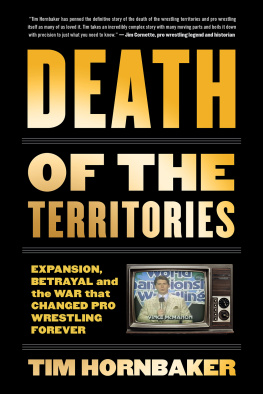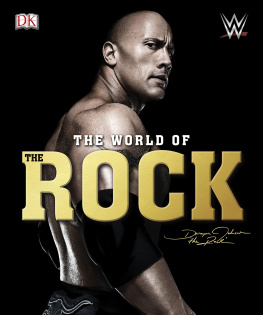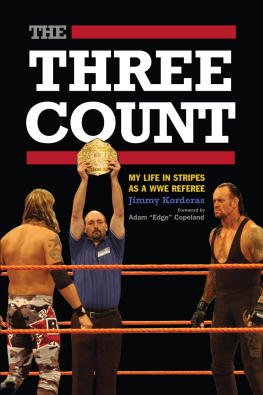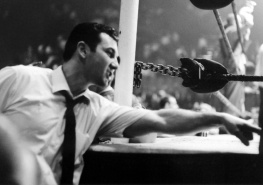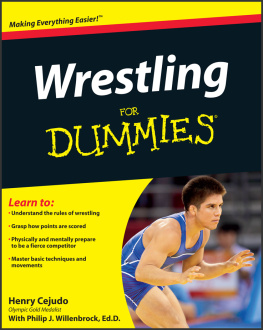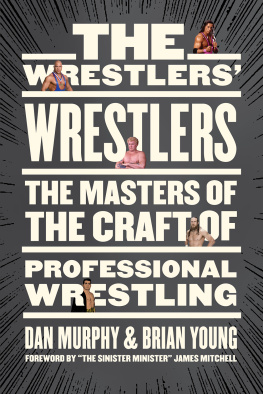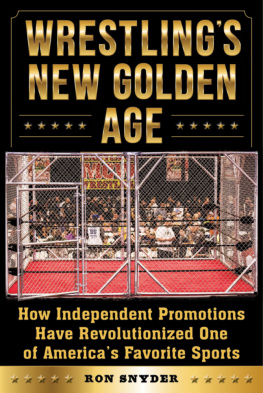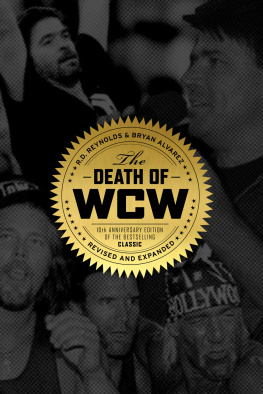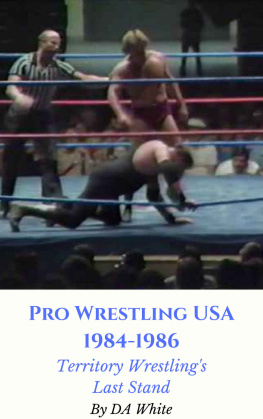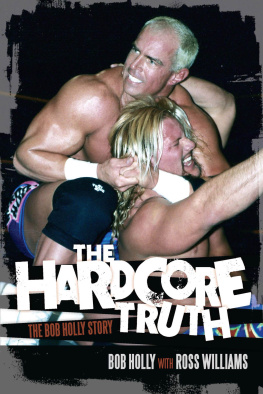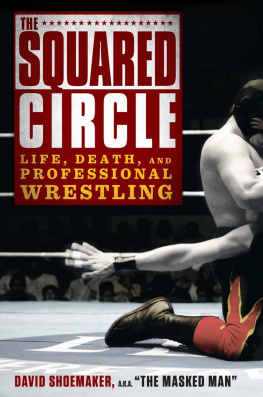For their eternal support and encouragement, Id like to thank my family, Jodi Hornbaker, L.W. Hornbaker, Timothy and Barbara Hornbaker, Melissa Hornbaker, Virginia Hall, Sheila Babaganov, Frances Miller, and John and Christine Hopkins.
Additional gratitude goes to my editor Michael Holmes for his tireless efforts and superb advice, and to everyone at ECW Press. Many thanks go out to Amy Miller and the amazing Interlibrary Loan team at the Broward County Main Library in Fort Lauderdale, FL.
A big thank you goes out to wrestling historian Steve Yohe for his unflinching assistance in the creation of this book. For their help in answering my questions, providing documentation, and sharing their memories, Id like to extend my warmest gratitude to the following: J Michael Kenyon, Don Luce, Jeff Walton, Steve Dini, Gary Juster, Dave Meltzer, Jim Zordani, Graham Cawthon, Steve Johnson, Libnan Ayoub, Greg Oliver, Daniel Chernau, Gene Bowman, Dr. Mike Lano, Scott Teal, Rich Tate, Dick Bourne, Matt Farmer, Kit Bauman, Brian Bukantis, Glenn Mon, Arnie Weintraub, Noah Warren of the Minneapolis Central Library, Randy Thompson of the National Archives and Record Administration at Riverside, Betty Furimsky of the National Archives and Record Administration at Chicago, and Tracy L. Goss of the Michigan Corporations Division.
From makeshift mats in barns to the largest arenas in the world, professional wrestling has really come a long way to become an international phenomenon. Though its evolution has been gradual, it received significant help from innovative promoters looking to change the core aspects of the business. For example, the matches themselves needed to be improved. Instead of developing at a snails pace with protracted rest holds, bouts became more action-packed and exciting with aggressive competitors using a whole host of newfangled moves. The introduction of the flying tackle and the dropkick in the late 1920s and early 30s was revolutionary, and promoters wisely built upon their popularity. Around the same time, wrestlers were testing the waters with character-based gimmicks, and good versus evil feuds were born, invoking incredible audience reactions.
This is all old hat in todays marketplace, but in the early days, everything was remarkably unsophisticated. With no clear-cut and defined wrestling organizations to manage the day-to-day operations of the industry, the sport was completely devoid of orderliness. It wasnt until the 1920s and 30s that circuits were fashioned and shows were offered on a more regular basis in specific regions. Wars between grappling syndicates were legendary, akin to those between crime organizations erupting across the United States. But in place of bootlegging and prostitution, promoters were at odds over high-value attractions and territorial control, and money was the bottom line. Those who had it wanted more, and small-timers just wanted to make a living.
On September 16, 1930, the sports first major three-letter acronym to be used with any consistency made its debut with the advent of the National Wrestling Association. An outgrowth of the National Boxing Association, the NWA was administered by state athletic commissioners, and its mandate was to keep pro wrestling on the level. In truth, those involved were often more interested in the political ramifications and profit margins of the sport than anything else. They monitored the business, stepped in when convenient, but mostly collected money for little in return. The promoters who dealt with the NWA were protected to a certain extent, and if they kept their noses clean, they were allowed to run their operations unhindered.
Rather than be pushed around by political appointees, promoter Paul Bowser in Boston struck back at the NWA concept by creating his own private group, the American Wrestling Association, in 1931. He occasionally worked with local bureaucrats for photo opportunities to garner publicity, but he had the first and last say in whatever happened in his rings. Columbus, Ohio, promoter Al Haft followed with the Midwest Wrestling Association that same year, and, like Bowser, Haft crowned his own regional world heavyweight champion, the first of whom was John Pesek. Haft was fully autonomous in his leadership, unlike those in NWA states who were bogged down by hierarchy and regulations.
Bowser and Haft created a local circuit for their wrestlers and champions, and by the mid-1930s, most major promoters had done the same. On a national level, promotional alliances such as The Trust were organized and thrived until being destroyed by greed. Wrestling was plagued by a general lack of integrity among promoters, and partnerships were almost always on shaky ground. For that reason, the sport entered a never-ending cycle of conflict. Within the chaos were innumerable heavyweight title claimants, and conniving promoters were doing everything in their power to tear down their rivals. Wrestlers jumped sides with impunity, seeking the best financial deal they could make, and again, an overall lack of integrity left everything fair game.
Yet, some promotional alliances survived. In 1948, Paul Pinkie George of Des Moines, Iowa, aligned with affiliates in several neighboring states and expanded his localized National Wrestling Alliance into a budding cooperative. This new NWA was completely independent of all established organizations, including the still-active National Wrestling Association. Unlike the Bowser and Haft groups, the Alliance wasnt structured with one man at the top of the pyramid, but allowed each and every man to have an equal membership. And since the body was founded and run by the promoters themselves, they implemented a crafty set of bylaws that protected their interests. Pro wrestling had never seen anything like it.
Of the many statutes written into the new organizations bylaws, the acknowledgment of specific territories was among the most consequential. His clean-cut, no-frills style was crucial as promoters pushed wrestlings legitimacy. In this kayfabe era, it all worked beautifully. Focusing on bringing in the best big-named talent and fostering a long-term relationship with the wrestling public in their areas, promoters used television to welcome a new generation of enthusiasts to the sport. Must-see performers like Gorgeous George and Antonino Argentina Rocca lit up arenas from coast to coast. Within its first year, the Alliance had spread from its humble beginnings in the Midwest to include Los Angeles, Toronto, Honolulu, and New York and all points in between. Membership was attractive to promoters because the NWAs wide-ranging influence all but guaranteed success.
But the NWA didnt eradicate the competitiveness of wrestling promoters and, in some cases, might have heightened the drama. For example, in 1950, Chicagos Fred Kohler, a bespectacled entrepreneur with an enormous sense of humor, found no comedic value in the help his cross-town rival, and non-NWA member, Leonard Schwartz was receiving from Al Haft, his supposed Alliance brother. To Kohler, it was an egregious violation of organization rules. He pleaded his case to Alliance members to have Haft immediately cease his incursion into the Windy City. Haft believed he had a right to book his wrestlers to Schwartz, and the situation escalated into a full-fledged feud. Adding the importance of television to the fray, and with great sums of money involved, neither side wanted to back down. Kohler, in a fit of anger, resigned from the NWA, only to be coaxed back a short time later. Finally, after painstaking negotiations, the conflict was resolved with both operations running peacefully in Chicago.

